
With a baby at 5 weeks pregnant, you are probably experiencing a real rollercoaster of emotions right now. Excitement, disbelief, joy, and perhaps even fear. Emotional chaos at the beginning of pregnancy is the most normal thing in the world. Every feeling is allowed at this stage. You probably don’t even feel pregnant yet. That too is completely normal. However, enormous changes are already taking place in your body.
In this article, we take you on a journey through week 5 of pregnancy and explain everything you need to know about your baby’s development, the first signs of pregnancy, and the changes happening in your body. Let’s get started.
Week 5 of pregnancy at a glance
Your baby:
- Your baby at 5 weeks pregnant is about the size of a sesame seed.
- The embryo begins with the formation of the first cells.
- The neural tube forms (from which, among other things, the spine later develops).
- Important nutrients are already being supplied to the embryo via the umbilical cord.
Your body:
- You may already be experiencing the first signs of your pregnancy and suffering from some symptoms/pains.
- Pay attention to a healthy, balanced diet and take breaks if you are feeling exhausted.
- You may experience pain similar to your period. This usually indicates the loosening of tissue. If the pain is severe, please contact your doctor.
- Your hormone levels are changing, which can result in you experiencing mood swings.
Interesting facts about foetus and mum:
- If you are expecting multiples, it is likely that more than just one amniotic sac can be seen during an ultrasound at this stage.
- If you have heavy bleeding and your noticeable symptoms suddenly decrease, please consult your gynaecologist or other medical professionals immediately.
Development of the baby in the 5th week of pregnancy
Your baby (which is still referred to as an embryo at this stage) is now about the size of a small sesame seed and visually resembles a tiny little tadpole.
The fertilised egg in your womb has already divided many times and formed different cell layers. From the outer layer of the cell, your baby's teeth, skin, nervous system and sensory organs will develop. The middle cell layer will form the heart, bones, muscles, lymphatic and blood vessels. Organs such as the liver, thyroid gland or bladder will develop from the inner cell layer.
The most important facts about your baby in week 5 of pregnancy:
- Heartbeat: Towards the end of the 5th week of pregnancy, your baby's heart begins to beat, even if it is not always visible on the ultrasound.
- Embryonic phase: Your baby is now in the embryonic phase, during which the vital organs are developing.
- Gestational sac: In week 5 of pregnancy, the gestational sac surrounds the embryo. It protects the baby and will later develop into the placenta, which supplies nutrients.
- Early developmental steps: The formation of the nervous system and the beginning of brain development take place. These early steps are crucial for your baby's further development.
Your body in the 5th week of pregnancy
In your body, an incredible number of things are happening right now. In week 5 of pregnancy, your body is already preparing itself for the growing development of the embryo. At this stage, the fertilised egg has implanted itself in the uterus and is beginning to transform into an embryo.
The formation of the placenta begins shortly after implantation and is completed by the 10th week of pregnancy. Until then, the embryo receives everything it needs from the so-called yolk sac.
Your hormone levels are changing. In particular, the level of progesterone, a hormone that maintains the uterine lining, increases. Many pregnant women don’t notice anything about their pregnancy yet in the 5th week. Others are already struggling with “classic” symptoms such as nausea.
Tips for the 5th week of pregnancy
As soon as your period is late and you have a positive pregnancy test (you can get these z.B. if you are holding one (from a chemist or pharmacy) in your hand, you should make an appointment with your gynaecologist to be certain about your pregnancy.
The initial examination to confirm pregnancy usually takes place between the 5th and 7th week of pregnancy. Even if it seems a little early to you now, you should start looking for a midwife. Unfortunately, nowadays it is best to start looking for a midwife as soon as you have a positive pregnancy test in your hand. Why this is the case and how you can find a midwife is explained in our my junior® guide. Feel free to also watch our video on YouTube about this topic.
Weight gain at this stage is often still minimal or not present at all, as your body is only just beginning to adjust to the pregnancy. Typical pregnancy symptoms can include nausea, fatigue, breast tenderness, headaches and more frequent urination.
Good sleep in the 5th week of pregnancy can be promoted by adapting the sleep environment, such as using comfortable pillows and creating a calm, relaxing atmosphere.
The 10 most common questions about week 5 of pregnancy
Is it normal to have no symptoms yet in the 5th week of pregnancy?
Yes, it is normal not to have any symptoms in the 5th week of pregnancy (week 5). Every pregnancy is unique, and the experience of pregnancy symptoms can vary.
Some expectant mums may only notice typical symptoms such as nausea, tender breasts, dizziness or fatigue in the later weeks, while others already experience discomfort in the very first weeks.
There are various reasons why some women do not experience any symptoms in the 5th week of pregnancy. These include individual differences in hormone levels, the body's response to pregnancy, and also psychological factors.
How reliable is a pregnancy test in the 5th week of pregnancy?
In the 5th week of pregnancy, a pregnancy test is generally quite reliable, especially if carried out correctly. Pregnancy tests measure the presence of the hormone hCG, which can be detected in the body of a pregnant person.
Most commercially available pregnancy tests can detect hCG about 10 to 14 days after conception, which roughly coincides with the time when the menstrual period is missed. As many women do not know exactly when fertilisation took place, it can be helpful to take the test a few days after the missed period to ensure that the hCG level is high enough to be detected by the test.
It is important to follow the instructions on the pregnancy test carefully and to carry it out at the correct time in order to maximise accuracy.
Can I already notice changes in my body in the 5th week of pregnancy?
In pregnancy week 5 (week 5 of pregnancy), some mums notice the first changes to their bodies, while others may not yet feel any noticeable differences.
Possible changes include more sensitive or larger-looking breasts, darker nipples, and visible veins on the chest. Many pregnant women also feel particularly tired, as the body requires extra energy for embryonic development. Nausea, especially in the morning, and more frequent urination can also occur. The sense of smell may change, with increased sensitivity to certain odours. Weight gain at this stage of pregnancy is usually minimal.
What diet is recommended in the 5th week of pregnancy?
In the 5th week of pregnancy (week 5), a balanced and healthy diet is particularly important in order to z.B. to support the growth and organ development (such as the brain, heart, lungs) of the baby and to meet the nutritional needs of the expectant mother.
A diet rich in fruit, vegetables, wholegrain products, lean protein and healthy fats is recommended. Fruit and vegetables provide important vitamins, minerals and fibre, while wholegrain products supply energy and support digestion. Lean protein from sources such as poultry, fish, pulses and tofu is important for the growth and development of the baby.
It is also important to consume enough fluids, preferably in the form of water. Alcohol and nicotine, caffeine, and raw or undercooked meat should be avoided in order to minimise the risk of complications.
If you are unsure about nutrition during pregnancy, it is advisable to seek advice from a doctor, midwife or nutritionist.
Am I allowed to drink coffee during pregnancy?
It is recommended to limit caffeine intake during pregnancy. Experts advise restricting caffeine consumption to around 200 mg per day, which is roughly equivalent to one cup of coffee.
What kind of exercise am I allowed to do in the 5th week of pregnancy?
In the 5th week of pregnancy (week 5), it is important to be cautious with physical activity.
Light to moderate exercise in the form of walking, swimming, yoga or gentle stretching is generally safe and can even be beneficial. However, it is recommended to avoid high-performance sports and activities with a high risk of injury.
It is advisable to consult your doctor before starting a training programme, in order to obtain further information and to pay attention to your body’s signals.
When will I be able to feel the baby's movements?
Most women feel their baby’s movements for the first time between the 18th and 22nd week of pregnancy. This is often described as a gentle fluttering or tingling sensation in the abdomen and can be perceived differently from woman to woman. In the weeks that follow, the baby’s movements become stronger and more noticeable.
Is it possible to see a heartbeat on an ultrasound in the 5th week of pregnancy?
In the 5th week of pregnancy (week 5), it is possible to detect the embryo’s heartbeat on an ultrasound, although this is not the case for all women. The heartbeat usually becomes visible between the fifth and sixth week of pregnancy.
The beating of the heart can be seen as a pulsating dot on the ultrasound image and is one of the most exciting moments in the pregnancy calendar for many expectant parents.
What changes should I expect in my body?
In the 5th week of pregnancy (week 5), noticeable changes may already occur in the female body. These may include more sensitive or seemingly larger breasts, darker nipples, and increased tiredness. Some women may also notice the first signs of nausea or more frequent urination. While these symptoms do not appear in all women, they are typical signs of early pregnancy and may vary over the coming weeks.
Which vitamins and nutrients are particularly important right now?
In the 5th week of pregnancy (week 5), certain vitamins and nutrients are particularly important for the healthy development of the baby and the well-being of the mother. These include folic acid, which supports the formation of the neural tube, iron for the production of red blood cells, calcium for bone health, omega-3 fatty acids for the development of the brain and eyes, as well as vitamin D for bone health and to reduce the risk of pre-eclampsia.

 Pushchair
Pushchair 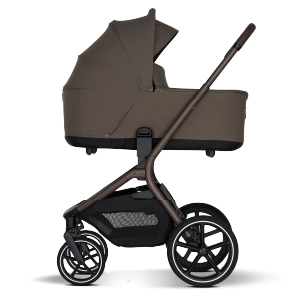 MAVI
MAVI 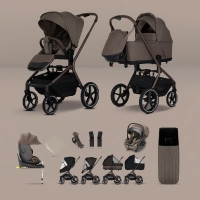 MAVI Bundle
MAVI Bundle  VIGO²
VIGO²  VITA unique³
VITA unique³ 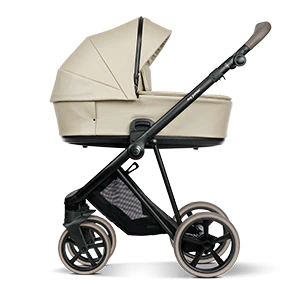 VIGO² Alcantara
VIGO² Alcantara 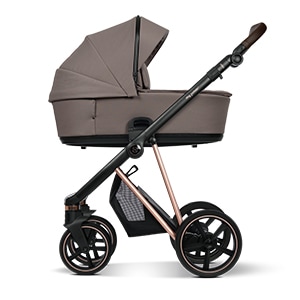 VIGO
VIGO 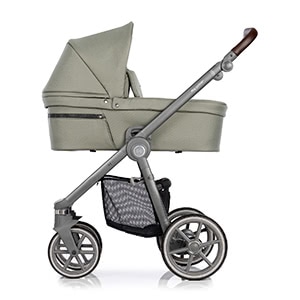 VITA HOPE
VITA HOPE 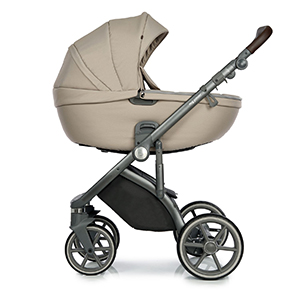 VITA unique²
VITA unique² 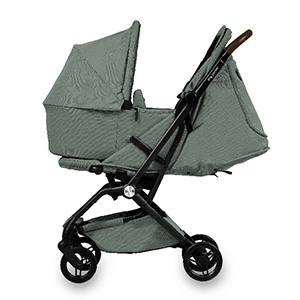 PICO³ with tub
PICO³ with tub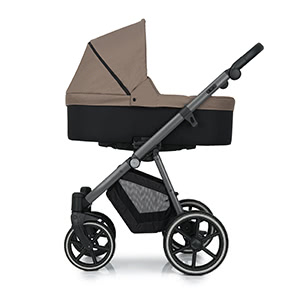 NOAX²
NOAX² 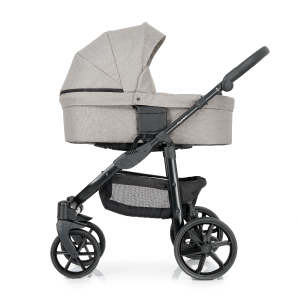 MIYO²
MIYO²  Pram tests
Pram tests  Consultation
Consultation  Buggies
Buggies  PICO³
PICO³  PLIA²
PLIA²  PLIA² Air
PLIA² Air  PICO³⁶⁰
PICO³⁶⁰  PICO³ with tub
PICO³ with tub  PICO tub
PICO tub  PICO infant car seat adapter
PICO infant car seat adapter  Limited Editions
Limited Editions 









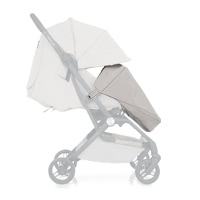

 Limited Edition Parasol
Limited Edition Parasol  Limited Edition Baby Carrier
Limited Edition Baby Carrier  Child seats
Child seats  All Isofix Bases
All Isofix Bases  AURAᵉʳᵍᵒ
AURAᵉʳᵍᵒ  Aura Pro
Aura Pro  Beam
Beam  Cyro 360
Cyro 360  Base 360
Base 360  Base Static
Base Static  Capsule System
Bundle
Capsule System
Bundle  Beam Bundle
Beam Bundle 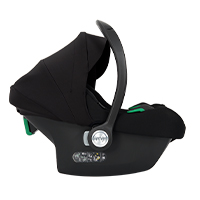 Avionaut Cosmo
Avionaut Cosmo 
 Love Sale
Love Sale
 Reviews
Reviews  Read reviews
Read reviews  Write a review
Write a review 
 Home
Home  Fabric sample
Fabric sample  Baby carriers
Baby carriers  LUVA
LUVA  NAMI
NAMI  NAMI with ring
NAMI with ring  Accessories
Accessories  Vouchers
Vouchers  Discover my junior®
Discover my junior®  About us
About us  In your vicinity
In your vicinity  All my junior
All my junior Flagship Store
Aachen
Flagship Store
Aachen  Flagship Store
Hamburg
Flagship Store
Hamburg  Flagship Store
Salzburg
Flagship Store
Salzburg  Flagship Store Binzen
Flagship Store Binzen
 Flagship Store
Krefeld
Flagship Store
Krefeld  Studio Cologne
Studio Cologne  Studio Trier
Studio Trier  Studio Braunschweig
Studio Braunschweig
 Studio Metzingen
Studio Metzingen
 my junior® pram in
Switzerland
my junior® pram in
Switzerland  Help and Contact
Help and Contact  Useful
Useful  Career
Career  Press
Press 













